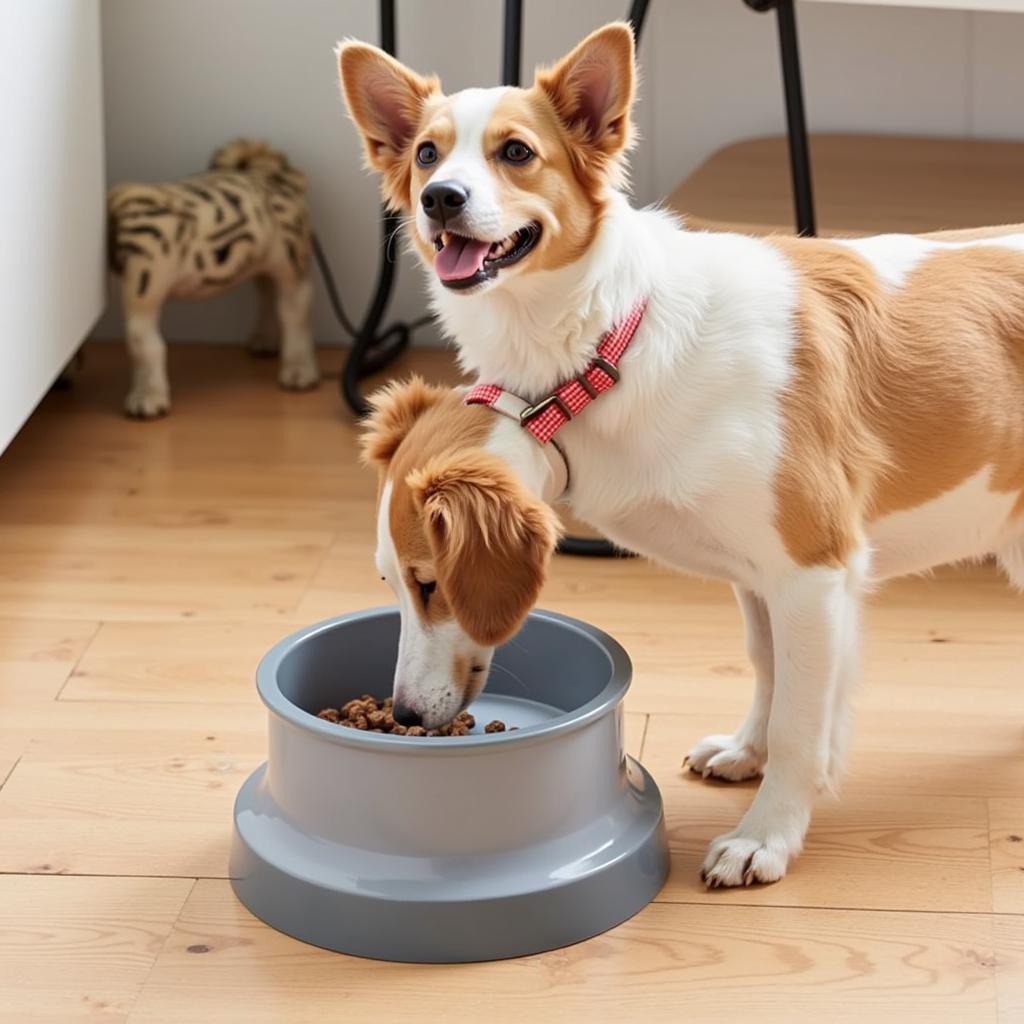You rush home to greet your furry friend, only to find a pile of undigested kibble on the floor. Your dog is looking at you with those innocent eyes, tail wagging, seemingly unfazed. Sound familiar? “Dog Throwing Up Undigested Food Right After Eating” is a common concern for pet parents, and it can be a sign of several underlying issues. Let’s dig deeper (pun intended!) into the possible reasons behind this unpleasant phenomenon and discuss what you can do to help your beloved companion.
Why is My Dog Vomiting Undigested Food?
First things first, it’s important to understand the difference between vomiting and regurgitation. Vomiting is a forceful expulsion of stomach contents, often accompanied by retching or heaving. Regurgitation, on the other hand, is a passive process where undigested food comes back up the esophagus shortly after eating.
When your dog throws up undigested food right after eating, it’s most likely regurgitation. This is usually caused by:
- Eating too quickly: Just like us, dogs can get a little too excited at mealtime and gobble down their food without chewing properly. This can lead to food getting stuck in the esophagus, triggering regurgitation.
- Overeating: If your dog’s eyes are bigger than their stomach, they might overeat and overload their digestive system. This can cause them to regurgitate the excess food.
- Esophageal issues: Sometimes, anatomical abnormalities or conditions affecting the esophagus can hinder food from reaching the stomach properly.
 Dog Eating Too Fast
Dog Eating Too Fast
While regurgitation is the most likely culprit in this scenario, vomiting undigested food can occur, too. This is generally more serious and can indicate:
- Food sensitivities or allergies: Just like humans, dogs can have sensitivities or allergies to certain ingredients in their food. If your dog throws up shortly after eating a particular type of food, it could be a sign of an adverse reaction.
- Gastrointestinal obstructions: Ingestion of foreign objects, such as toys, bones, or fabric, can create blockages in the digestive tract, leading to vomiting, among other symptoms.
- Infections: Viral or bacterial infections can cause inflammation in the stomach and intestines, leading to vomiting and other digestive upset.
- Medical conditions: Certain medical conditions, such as pancreatitis, inflammatory bowel disease, or even cancer, can manifest as vomiting.
When to Worry: Recognizing the Warning Signs
While an occasional episode of regurgitation might not be a cause for major concern, it’s crucial to monitor your dog for any other unusual signs. Seek immediate veterinary attention if you notice any of the following:
- Frequent vomiting or regurgitation
- Blood in vomit or stool
- Loss of appetite
- Lethargy or weakness
- Abdominal pain or swelling
- Diarrhea
- Weight loss
These symptoms could indicate a more serious underlying condition that requires prompt veterinary diagnosis and treatment.
Preventing Your Dog from Throwing Up Undigested Food
The good news is that there are several things you can do to help prevent your dog from throwing up undigested food:
- Slow down mealtime: If your dog is a speed eater, consider using a slow-feed bowl or puzzle feeder. These tools encourage your dog to eat more slowly and chew their food thoroughly.
- Feed smaller, more frequent meals: Instead of one or two large meals, try feeding your dog smaller portions more frequently throughout the day. This can prevent overeating and ease the workload on their digestive system.
- Choose the right food: Switching to a high-quality, easily digestible dog food formulated for your dog’s breed, age, and activity level can make a significant difference. Consider talking to your vet about a food sensitivity test if you suspect your dog might have an allergy.
 Dog Using a Slow Feeder Bowl
Dog Using a Slow Feeder Bowl
- Don’t exercise immediately after meals: Encourage your dog to rest for at least an hour after eating to allow for proper digestion and minimize the risk of regurgitation.
- Keep a watchful eye: Always supervise your dog, especially puppies, to prevent them from ingesting foreign objects that could cause obstructions.
What to Do if Your Dog Throws Up Undigested Food
If your dog throws up undigested food, don’t panic. Here are some steps you can take:
- Remove food and water: Withhold food and water for a few hours to give your dog’s digestive system a break.
- Observe your dog closely: Monitor your dog for any other symptoms, such as lethargy, loss of appetite, or repeated vomiting.
- Contact your veterinarian: If the vomiting persists, worsens, or is accompanied by other concerning symptoms, contact your veterinarian immediately.
Frequently Asked Questions (FAQ)
Q: Is it normal for dogs to throw up undigested food occasionally?
A: An occasional episode of regurgitation, especially in dogs that eat quickly, might not be a cause for alarm. However, frequent vomiting or regurgitation should always be investigated by a veterinarian.
Q: Can I give my dog over-the-counter medication for vomiting?
A: It’s important to consult with your veterinarian before giving your dog any medications, even over-the-counter ones. Some human medications can be toxic to dogs.
Q: What should I feed my dog if they keep throwing up their food?
A: If your dog is experiencing frequent vomiting, your veterinarian might recommend a bland diet, such as boiled chicken and rice, to help settle their stomach.
Q: How can I tell if my dog has a food allergy?
A: Food allergies in dogs can manifest as digestive upset, including vomiting, diarrhea, and skin problems. The best way to diagnose a food allergy is through an elimination diet trial supervised by your veterinarian.
Need More Help?
If your furry friend continues to experience digestive issues or you have further questions, don’t hesitate to reach out. Contact us at:
Phone Number: 02437655121
Email: minacones@gmail.com
Or visit us at:
3PGH+8R9, ĐT70A, thôn Trung, Bắc Từ Liêm, Hà Nội, Việt Nam
Our dedicated team is available 24/7 to provide you with expert advice and support. You can also learn more about keeping your dog healthy and happy by exploring other helpful resources on our website, like our article on dog keeps throwing up undigested food.
Remember, a happy tummy means a happy pup!